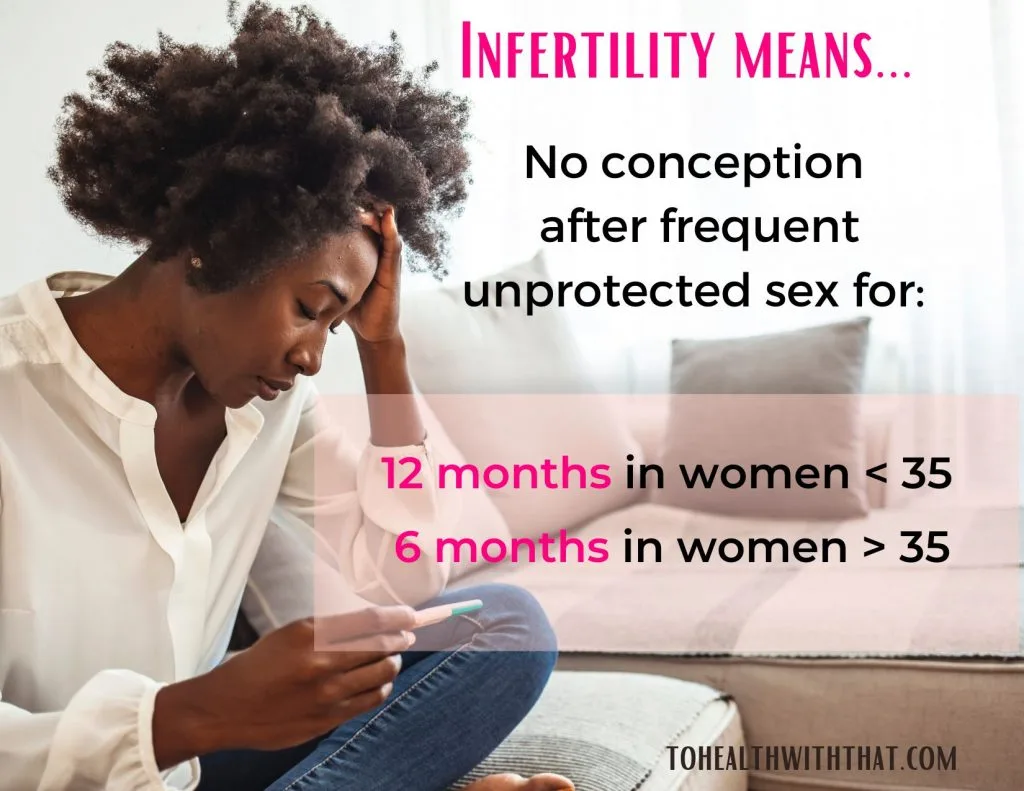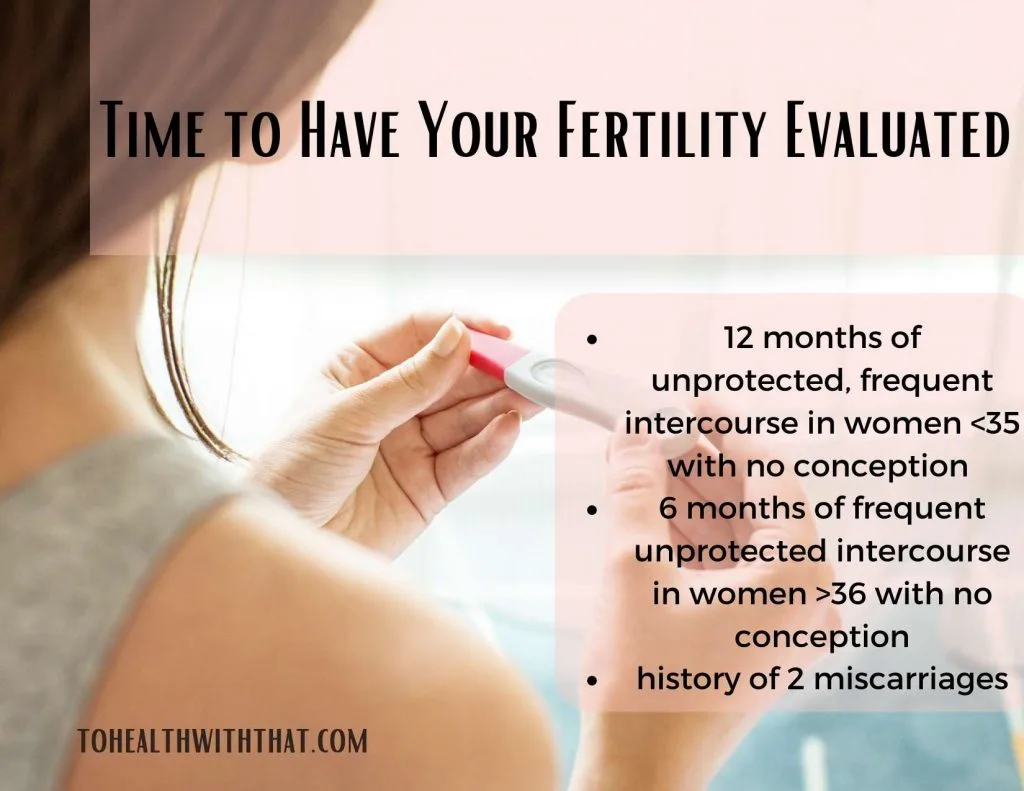This is probably not a question you’ve ever thought to ask yourself, but the answer might surprise you – especially if you’re a little bit older or if you’re dealing with any genetic polymorphisms that affect hormone levels like MTHFR or COMT.
What is Infertility?
Infertility is a complex disorder with significant medical, psychosocial, and economic aspects.
It is defined as inability of a couple to conceive after 12 months of regular intercourse without use of contraception in women less than 35 years of age; and after six months of regular intercourse without use of contraception in women 35 years and older. The timing and definition are the same for women using sperm donors.
Also, please understand we are using the term “women” but this also applies to trans men and non-binary people who have ovaries and a uterus.
Statistically, females aged 20 to 24 years had the lowest rates of infertility while those aged 35 to 39 years had the highest rates.

Words related to fertility
- Subfertility is both Dr. Amy and Dr. Kate’s preferred term because “infertility” sounds too final and sub fertility more adequately reflects that there is typically hope in the situation.
- Fertility is the ability to have a clinical pregnancy (but this may not result in a live birth so you could be “fertile” but unable to have a baby.
- Fecundity is clinically defined as the capacity to have a live birth – this is the actual goal of baby in arms.
- Fecundability is the probability of achieving a pregnancy in a single menstrual cycle with adequate sperm exposure and no contraception that results in a live birth.
- Sterility is a permanent state of infertility this could be a hormonal or a structural situation for women, for example a woman post hysterectomy, or it could be a zero sperm count for men.
When Should You Be Evaluated By A Professional?
The general consensus among infertility experts is that infertility evaluation should be undertaken:
- For couples who have not been able to conceive after 12 months of unprotected and frequent intercourse if they are under 35 years old.
- Earlier evaluation should be undertaken based on medical history and physical findings, and in women over 35 years of age
- After two miscarriages.

Gene SNPs and Fertility
There are a number of overt genetic disorders that complicate pregnancy, but even simple polymorphisms can pose a problem.
MTHFR is a known issue with fertility, being implicated in repeat miscarriages, neural tube defects, and also in low sperm count in men.
COMT mutations are also an issue because with COMT mutations there is a much higher risk of high estrogen disease like uterine fibroids or endometriosis as well as a risk of low relative progesterone.
There are other gene SNPs that can cause complications as well, but these are two we’ve talked about before. Most practitioners or fertility groups won’t evaluate your genes as a first step, so if you suspect these issues then talk with your practitioners to request appropriate testing.
It is important to note that there is a link between mental health and fertility. Stress has been shown to contribute to infertility, and infertility often causes stress. A number of studies have found that infertility is often associated with higher levels of stress, depression, and anxiety, regardless of whether it is male or female. Those who experience recurrent pregnancy loss (RPL) can experience symptoms of post-traumatic stress disorder (PTSD) right after the event.
Here are some suggestions for coping with the stress of infertility that may assist you in your journey on your way to achieving a healthy pregnancy.
- Ensure you take care of your Mental Health : Acknkowleging that your fertility journey can be hard on your mental health and being willing to take proactive steps to fix it can change the course of your fertility story. This could mean seeking counseling or therapy, yoga classes, meditation, attending church or spiritual services, or just spending time with friends.
- Focus on Your Present :It’s impossible to change what happened in the past, but so easy to spend your time rehashing what you “should have” and “could have”. There is no way for you to control what will happen in the future either, so stop pre-living your worries and anxieties. As much as possible, try to stay in the present, because this is the only moment in which you can control your behavior in a way that can reduce your anxiety and stress.
- Always Take Care of Yourself:Treat yourself with the same gentleness and kindness that you would show your family and friends. Make sure that you get enough sleep, exercise, spend time alone, and spend time with others in order to feel cared for. Try to be the best friend you can be to yourself all the time!
- Converse with Yourself:Take a moment to give yourself a pep-talk because what we say to ourselves has a powerful effect on us. The fact that other people keep reminding you that there is always a way to build a family usually doesn’t have a great deal of effect on you. As long as you keep in mind that there is always a way, your mood will usually lift in no time at all. Give it a shot!
- Be Social:There are many reasons to feel hesitant about discussing infertility with family, friends, or even at work. Keeping medical issues private is a very personal decision, and you may want to do so for a number of reasons, from not wanting unsolicited advice to not wanting to hear other people’s stories about how they were able to conceive, to feeling there is a stigma attached to infertility. Keeping quiet may make you feel isolated just when you need understanding and support more than anything else. For finding others to talk to in confidence, make use of resources from your fertility clinic or from national fertility organizations like RESOLVE. There is no doubt that emotions are much more manageable when they are spoken out loud than when they are buzzing around in your head.
- Keep Your Goals Clear:Work can serve as an effective distraction from the persistent anxiety you may be feeling as a result of your infertility treatment, as stressful and preoccupying as it may be. Keeping yourself busy with projects can be a great way to distract you, give you a feeling of accomplishment, and help boost your confidence and self-esteem.
- Try Cognitive Restructuring:In cognitive terms, restructuring can be defined as the act of creating new viewpoints by changing the way you think. These terms together indicate that we can choose to think in a new way and as a result, we are able to have new behaviors and feelings as a result. Suppose, for example, we focus on hopeless thoughts for so long that we convince ourselves and everyone around us that hope is not worth wasting time and energy on, as our inertia can lead us to believe this. One of the most common reasons that patients drop out of fertility treatment is due to this thought process. However, if we choose to have a positive attitude towards problems, we are more likely to approach these problems with a strategic approach that will lead to positive self-fulfilling prophecies that will help us achieve our goals.
- Check If You Have Depression:You may feel tired, sad, unmotivated, or apathetic if you suffer from mild depression. Depression that is more severe can result in frequent crying, loss of appetite, loss of joy, and feelings of despair. All signs of depression should be taken very seriously and addressed as soon as possible to ensure that your suffering is lifted as soon as possible. Whether it is triggered by hormonal therapy, a recurrent pregnancy loss, treatment failure, financial stress or relationship stress, there is help available for you. You should speak with your physician regarding a referral for therapy, support, and/or medication if you feel you need them. Changing your fertility treatment or taking a break from it may also help.
- Periods of irregularity:It is estimated that the average woman’s cycle lasts 28 days. Anything within a few days of that can be considered normal, as long as these cycles are consistent over time. If a woman has a 33-day cycle one month, a 31-day cycle the next, and a 35-day cycle the following month, then she is probably having “normal” periods.A woman, however, who is experiencing irregular periods is one who experiences cycles that vary so greatly that she cannot even begin to estimate when her period might arrive because her cycle is erratic. There are a number of reasons why this might occur, including hormone issues, or polycystic ovarian syndrome (PCOS). Infertility can be caused by either of these factors.
- Periods that are painful or heavy :The majority of women experience cramps during their period. It should be noted, however, those painful periods that interfere with your daily life could be a symptom of endometriosis.
- No periods:Women have a tendency to have off months here and there, and it’s not uncommon for them to have them. There are certain factors that can cause your period to temporarily disappear, such as stress or heavy exercise. It might be a good idea to get your fertility checked if you haven’t had a period in months.
- Hormone fluctuations:The signs of hormonal fluctuations in women could indicate that they may have issues with their fertility in the future. If you experience any of the following symptoms, talk to your doctor as soon as possible:
- Problems with the skin
- A reduced desire for sex
- Growth of facial hair
- Thinning hair on head
- Rapid weight gain or uncontrollable weight gain
- When you are having sex, you may experience pain:There are some women who have experienced painful sex their entire lives, so they have convinced themselves that it is normal to experience it. However, it’s not the case. It is possible that sexual discomfort is related to hormone issues, endometriosis, or to other underlying conditions that could also be contributing to her infertility.
MTHFR is a common genetic mutation that can contribute to anxiety, depression, fatigue, chronic pain, infertility, and more serious conditions like breast implant illness, heart attack, stroke, chronic fatigue syndrome, and some types of cancer. If you know or suspect you have an MTHFR variant, schedule a free 15-minute meet-and-greet appointment with MTHFR expert Dr. Amy today.
Book Your Appointment
